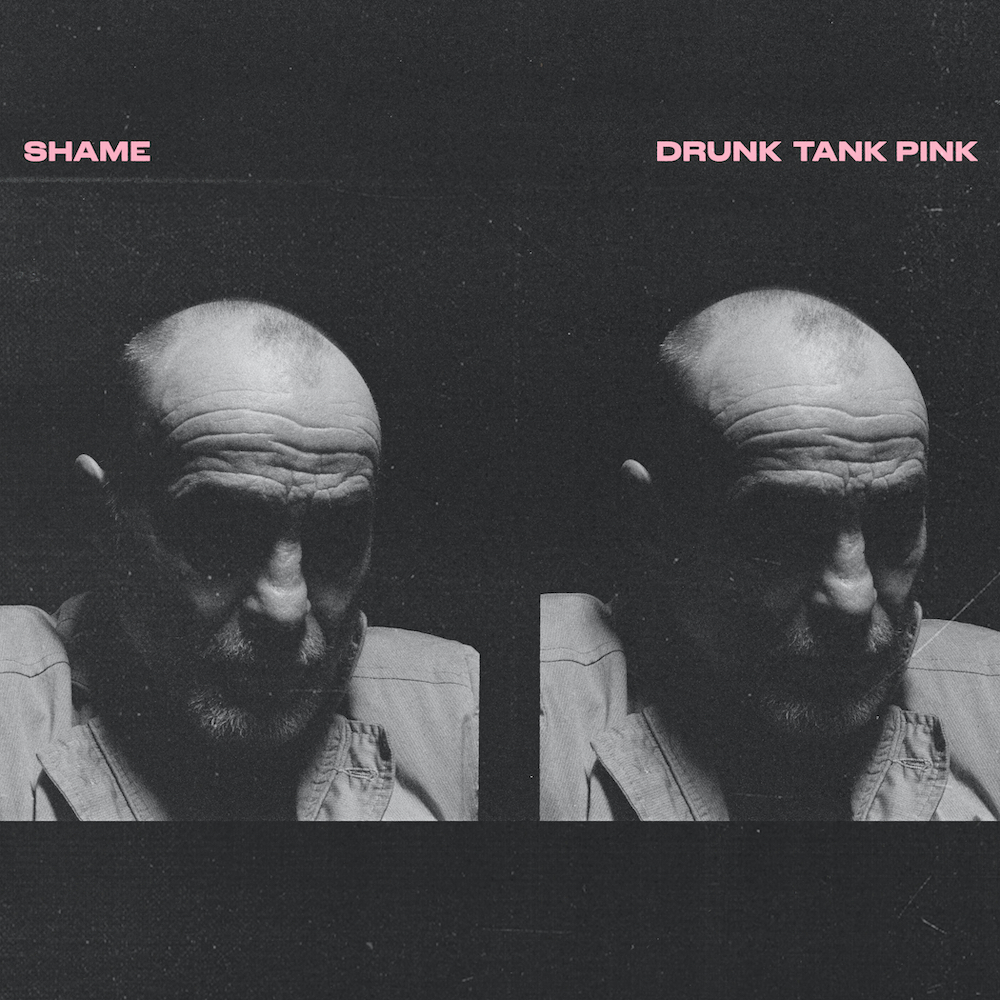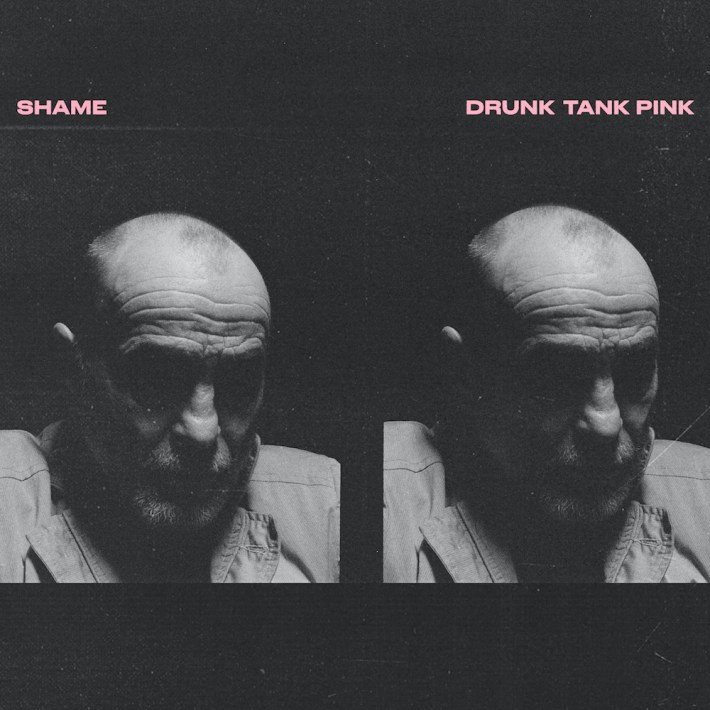After the early 2018 release of their debut album Songs Of Praise, it seemed like Shame were everywhere. In a sense, they literally were everywhere -- frontman Charlie Steen claims they played 172 shows a year, two years in a row. Like many hyped-up young bands of their generation, Shame toured relentlessly, and given they were still teenagers when the group first garnered attention, recent press materials asserting they partially grew up on the road don’t seem too hyperbolic. Eventually, there’s an aftermath. Sooner or later, you have to go home again and deal with the ramifications of years that are as blurry and confused as they are, theoretically, triumphant.
These were the circumstances that birthed Shame’s sophomore outing, Drunk Tank Pink. After a whirlwind couple of years, Steen and his bandmates -- Sean Coyle-Smith, Josh Finerty, Eddie Green, and Charlie Forbes -- returned home to find a new sense of dislocation. Now it came from the loss of their old haunts and the feeling of stillness after constant, frenetic movement. Some of them flailed through the reentry, Steen finding himself indulging every distraction possible and partying into the late hours of the night. Eventually, the band forced through the listlessness of it all, writing their way to a second album that sought to catalog where they were at the same time it could paint a way forward.
Drunk Tank Pink is named for a specific shade of pink, one used in the titular drunk tanks to help calm people down. In the context of Shame, it references a little cupboard Steen sequestered himself in. There, surrounded by the soothing color, he tried to write lyrics and unpack all the tangled fallout of Shame’s first few years and the physical and psychological toll it took on its members.
If Steen’s idea of immersing himself in the color was to answer the chaos in his head with some new tranquility, it didn’t work. At least, not if you were expecting Shame to respond to insularity by becoming a more meditative version of themselves. Drunk Tank Pink might eschew the adolescent rage of its predecessor, but it still roils and sputters. Steen is still yelling his head off half the time; you can still practically hear the spit and bile hitting the mic. But all of this in service of an album more frayed and bug-eyed than Songs Of Praise. Drunk Tank Pink is a freaked-out album spiritually, and it’s nearly as restless sonically.
In the process of trying to make sense of their lives, Shame also mutated as a band, chasing new sounds as if unexplored stylistic territory might hold the answers they were seeking. With the first actual stint of solitude and quiet since the band took off, Shame set about building these songs from new parts. Coyle-Smith, in particular, rejected much of his old approach. “I was so bored of playing guitar,” he said in a press bio. “The thought of even playing it was mind-numbing. So I started to write and experiment in all these alternative tunings and not write or play in a conventional ‘rock’ way.”
Across Drunk Tank Pink, you can hear Shame modulating, changing, forging something else. Inspired by newfound obsessions with Talking Heads, highlife, and ESG, Coyle-Smith led the band to places that complicated the aggressive charge of Shame’s old material. Opener “Alphabet” is no less emphatic than the band’s past ragers, but it finds Steen coaxing the band into a shout-along chorus that becomes infectious over light, shining stabs of guitar. There is a new groove and texture to Shame’s propulsion: Songs like “Nigel Hitter,” “March Day,” and “Water In The Well” could recall the funk-tinged end of the post-punk spectrum, but they could also just as easily echo the most frazzled borders of Britpop. Even when the band does return to the more frenzied, roaring aspect of their sound with late-album cuts “Great Dog” and “6/1,” they display a new sense of dexterity and control, like how “Harsh Degrees” only ruptures after ratcheting tension with the anxious tumble of its verses.
But perhaps most striking is the more atmospheric, moodier directions Shame venture into. With moments like the twilit “Friction” and the dramatic closer “Angie,” Songs Of Praise was not without its diversions to more contemplative places. But on Drunk Tank Pink, these take on a different form, dark and static-laced clouds like “Human, For A Minute” and the caustic haze of “Station Wagon” or “Born In Luton” after it collapses from its initial haywire guitars.
Some of Drunk Tank Pink’s mission statements arrive in its most energized moments. “I’m burning at both ends,” Steen proclaims in “Nigel Hitter,” a song otherwise referencing the monotony that could arise both out of constant touring and subsequently being stuck at home without anything to do. It’s a phrase that typically communicates exhaustion and maybe self-destruction, but on Drunk Tank Pink it also gets at a certain generational defeat, arising from the constant battle to find stable footing in a tenuous world. Steen has talked about an “identity crisis” that was common between the band and their non-musician friends alike as they all entered their twenties: "No one knows what the fuck is going on.”
It’s a simmering combination of disorientation and dejection that then runs through Drunk Tank Pink -- derived from the mental health trials of being a young musician, but not limited to that. These are feelings not unfamiliar to classic post-punk; perhaps it’s telling the genre has come back into vogue in recent years. With each new shape Shame twist their sound into here, it’s almost like they’re just trying to feel whole, or right, in some fashion. Songs like “Human, For A Minute” might not locate much solace -- “I’m half the man I should be,” Steen chants in the song’s gloomy outro -- but it’s at least reaching out: “I never felt human before” he repeats over and over until finally adding, “You arrived.”
From both a thematic and songwriting standpoint, Drunk Tank Pink’s centerpiece “Snow Day” also feels like the summation of everything Shame were grappling with and everything they were trying to become. It’s a stunning mini-epic, chattering rhythms and gurgling guitars kicking things off, Steen talk-singing his way to the song’s big noise-blasted climaxes. “I live deep inside myself/ Just like everyone else,” he says. That line might sum up the conflict defining the album: A retreat into the darkest recesses of one’s mind, and the effort to reconnect with people as our individual experiences parallel yet become less recognizable to each other.
Every bit of Drunk Tank Pink that could be solipsistically introspective -- the fact that these songs arose from a post-tour hangover, the album’s name coming from a literal isolation chamber -- is just a matter of breaking out of those confines. Of who Shame used to be, of the weird head fog that begins to separate you from other people as you move through the sudden, tectonic shifts of young adulthood. Drunk Tank Pink is the sound of crash landings, some specific to Shame’s life as a band, but other more abstract ones all too relatable to anyone who was young in tumultuous times. What makes Drunk Tank Pink an exhilarating and inspiring listen is that Shame eventually found something in the shadows. They could’ve destroyed themselves entirely, but instead they chose evolution.
Drunk Tank Pink is out 1/15 via Dead Oceans.
Other albums of note out this week:
• Buck Meek's Two Saviors.
• Sleaford Mods' Spare Ribs.
• Crack The Sky's Tribes.
• Dale Crover's Rat-A-Tat-Tat!.
• Insides' Soft Bonds.
• Why Don't We's The Good Times And The Bad Ones.
• Front Line Assembly's Mechanical Soul.
• Midnight Sister's Painting The Roses.
• Beach Bunny's Blame Game EP.
• Emma Ruth Rundle & Thou's The Helm Of Sorrow EP.







